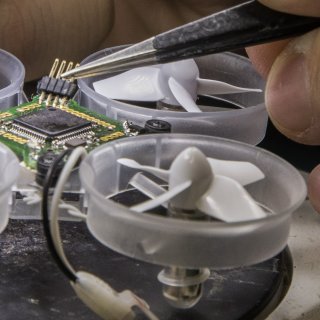Delft University of Technology offers the following masters:
BioRobotics is a specialization within the BioMechanical Design track of the MSc programme for Mechanical Engineering.
Bio-robotics emphasizes the analysis and design of robots meant to physically interact with humans. Topics include haptic interfaces, robotic arms, walking robots and other bio-inspired robots. A haptic interface is a controlling device for a robot or a virtual environment which provides the human operator with force feedback. This gives the operator additional information about the environment, real or virtual, to improve task performance. Another topic is bipedal-humanoid robots, which use the same strategy to walk as humans :. These robots are intended to assist in a human environment ("service robots"), to study human walking or for the entertainment industry. Students in this specialization are encouraged to take robotics-related courses from other departments, such as Robot Vision, Real-time Embedded Systems, or Artificial Intelligence.
Systems and Control covers the analysis and design of reliable and high-performance measurement and control strategies for a wide variety of dynamic technological processes.
Students who follow this 2 year, multidisciplinary Master's programme come from various backgrounds such as Mechanical, Electrical or Aerospace Engineering, but also from Applied Mathematics or Applied Physics. The first year consists of obligatory (40%) and elective (60%) courses. The obligatory courses include multivariable state-space control, physical and experimental modelling, filtering and control theory. The second year is devoted to an internship, literature study, and an MSc graduation project, either in collaboration with industrial partners, research institutes and universities, or in alignment with ongoing research projects in robotics or other fields within the Delft Center for Systems and Control. The MSc S&C is one of the five 3TU MSc programmes, with strong links to and cooperation with the other Dutch technical universities in Twente and Eindhoven.
“Automated driving will revolutionize transportation and enhance safety, comfort and efficiency”
The automotive field is in the midst of a transformation. Cheap sensors and powerful hardware, coupled with smart algorithms and big data rapidly advance the capabilities of modern vehicles.
In traditional vehicles, where the driver is under control, the automation level is gradually increased; with sophisticated highway autopilots in recent premium cars.
At the same time, the next generation is emerging: that of self-driving vehicles as part of a mobility service, where the human driver is no longer necessary and where any supervision is exerted remotely by an operator.
What will you learn
Education in automated driving focuses on perception to detect other road users, path planning and control to navigate through traffic, and human factors. An integrated approach is offered to design vehicle automation proving performance and safety in complex real world driving conditions.
Education in materials addresses the latest lightweight materials including composites, and their performance in durability, sustainability and energy absorption in crash conditions.
For more information, please click here.
Mechatronic System Design is a specialization within the Precision and Microsystems Engineering track of the MSc programme for Mechanical Engineering.
Students obtain an MSc degree in Mechanical Engineering. They follow one year of mechatronics-related courses (such as mechatronic system design, dynamics, micro- and nanofabrication, and measurement) and they spend one year on an (international) internship, literature study, and an MSc graduation project. Graduation projects are usually related to ongoing research projects on TU Delft and various high-tech companies such as Philips and ASML.
Embedded Systems is a MSc programme for students with a bachelor degree in Electrical Engineering or Computer Science.
Students obtain an MSc degree in Embedded Systems. They follow a little more than one year of courses such as embedded computer architecture and real-time systems, with the possibility to specialize in various directions (either more hardware-oriented, more algorithm-oriented, or more control systems-oriented), and they spend 9 months on an MSc graduation project.
Data Science and Technology is a track of the MSc programme for Computer Science.
Students obtain an MSc degree in Computer Science. They can choose to follow a little more than one year of courses on topics such as Artificial Intelligence, data visualization, multimedia, and serious gaming, followed by a graduation project of approximately 9 months.
